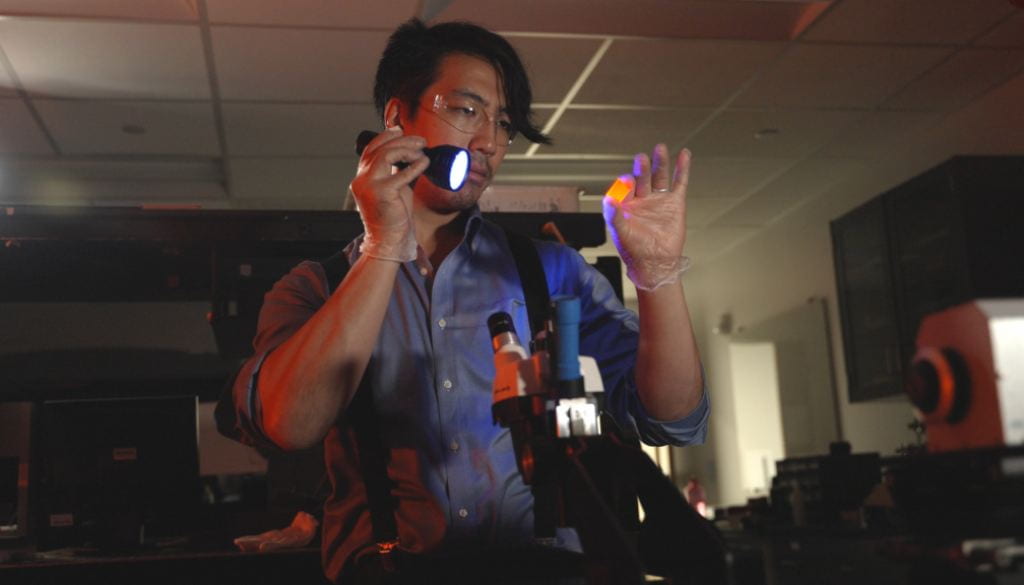NanoPattern Technologies has raised $1.5 million in a seed round to scale its photopatternable quantum dot ink, which enables the commercialization of next-generation displays.
Cofounded by Yu Kambe, PhD ’19, and Dmitri Talapin, Ernest DeWitt Burton Distinguished Service Professor in the University of Chicago Chemistry Department and Pritzker School of Molecular Engineering (PME), NanoPattern’s ink product is sold to display component makers to enable manufacturing of full-color microdisplays for augmented reality, virtual reality, wearables, smartphones, tablets, and televisions.
The latest funding follows a series of investments over the last few years, including $150,000 from the Polsky Center’s George Shultz Innovation Fund in 2021.
The startup, which participated in the Polsky Accelerator, I-Corps program, and Argonne National Laboratory’s Chain Reaction Innovations program, also received Phase I and II grants from the National Science Foundation’s (NSF) Small Business Innovation Research (SBIR) grant program – without which Kambe said the startup wouldn’t be in its current position: “It fueled the work that was needed to demonstrate the quantum dot ink.”
With the Phase II grant – nearly $1 million – the team was able to publically demonstrate sub-10 micron pixel resolution as well as reliability. And it has done so in partnership with the world’s largest quantum dot manufacturer, Nanosys Shoei.

“These quantum dots, a big component of our ink, are a public product. It’s already scaled,” explained Kambe. “From that standpoint, I think there is a lot of risk averted by being able to show that the process uses a commercial product.”
This de-risking and demonstration of key features opened up the opportunity to engage new customers and raise the funds needed to take next steps. Specifically, Kambe said they will use the money to transition from demonstrating the product to demonstrating product-specific features. The team will also solidify quantity control as well as manufacturing and engineering controls in addition to hiring a contract manufacturer to produce larger quantities of the link.
As part of this, they also have started to expand their network, including participating in the Luminate accelerator. “We have deepened relationships with chemical and display companies,” said Kambe. “The successful seed in itself is a good testament to the work that we’ve been able to do.”
Now at a point where its resolutions are reaching beyond that of dust, some of the work must transition to a cleanroom environment. Making the move to commercial and government cleanrooms is a big component of the fund raise, noted Kambe.
“Cleanrooms are notoriously very difficult to maintain, so having access to several in driving distance is something that you don’t see in a lot of places,” he explained, speaking to the advantages of being in the Chicago area ecosystem.
“Since 2021, we’ve seen a significant uptick in funding opportunities, real estate, as well as resources that are hard to get anywhere else, including cleanrooms and employees,” he said.
NanoPattern is currently hiring for Chicago-based senior engineers, with plans to grow the team from its current seven to nine.
“Looking at all of the great universities in the area, we’ve been able to hire a lot of people locally,” said Kambe, noting that the funding round was “truly a testament that you can fund raise in the Midwest.” And the startup will be doing so again soon.
“We want to attract even more good talent to the Midwest and we certainly would love to see similar representations in our next fund raise from Illinois and the Midwest,” he added. “There is a culture that is being built in Chicago and Illinois to really make a physical science startup work – and I’m very grateful for that.”
The funding round was led by Queen City Angels. Other major investors include St. Louis Arch Angels, Angel Star Ventures, NextCorps, and the state of Illinois as part of the Illinois Innovation Venture Fund (INVENT) program.
As a part of this raise, NanoPattern also has added three new board members: Homer Antoniadis, Sujatha Ramanujan, and Theodore (Ted) Capossela.

